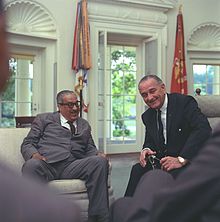| Thurgood Marshall Supreme Court nomination | |
|---|---|
 Marshall (left) and President Johnson meet in the Oval Office of the White House on June 13, 1967 (shortly before the announcement of the nomination) | |
| Nominee | Thurgood Marshall |
| Nominated by | Lyndon B. Johnson (president of the United States) |
| Succeeding | Tom C. Clark (associate justice) |
| Date nominated | June 13, 1967 |
| Date confirmed | August 30, 1967 |
| Outcome | Approved by the U.S. Senate |
| Senate Judiciary Committee vote | |
| Votes in favor | 11 |
| Votes against | 5 |
| Result | Reported favorably |
| Senate confirmation vote | |
| Votes in favor | 69 |
| Votes against | 11 |
| Not voting | 20 |
| Result | Confirmed |
Thurgood Marshall was nominated to serve as an associate justice of the Supreme Court of the United States by U.S. President Lyndon B. Johnson on June 13, 1967 to fill the seat being vacated by Tom C. Clark. Per the Constitution of the United States, the nomination was subject to the advice and consent of the United States Senate, which holds the determinant power to confirm or reject nominations to the U.S. Supreme Court. Marshall was confirmed by the U.S. Senate in a 69–11 vote on August 30, 1967, becoming the first African American member of the Court, and the court's first non-white justice.
While opponents of the nomination in the United States Senate denied being motivated by racism, many supporters of racial segregation opposed the nomination.